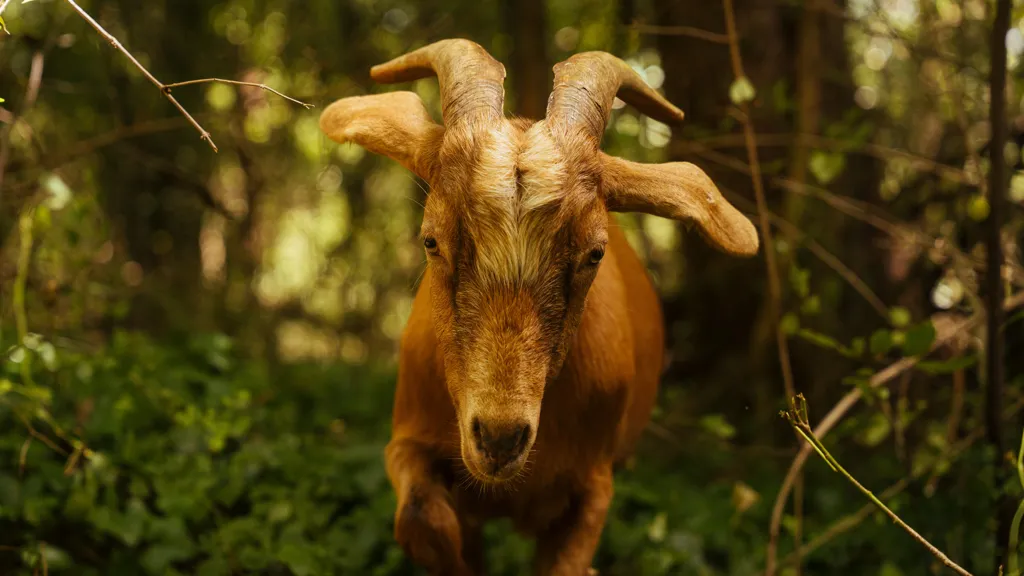For decades, invaders ran amok on Maclellan Island, a 19-acre nature refuge in the middle of the Tennessee River, in the heart of Chattanooga. The unwelcome guests included English ivy, Japanese honeysuckle and other invasive plants, which together formed impassable thickets that choked out native trees and shrubs.
Last year Jim Stewart, the executive director of the Chattanooga Audubon Society, which owns the island, tried to fight the invasives with fire, specifically a prescribed burn. But the marauding flora just smoked a bit, proving impervious to the flames.
That's when the city's fire chief, who attended the burn, offered some advice. "He said 'Jim, you really should get some goats out there,'" Mr. Stewart recalled.
So that's what Mr. Stewart did.
He reached out to Christina Herndon, owner of Circle N Stables, who had caprine connections. Two months later, six rented goats, paid for by donations, set hoof on the island, along with their guardian dog, Beo, a Great Pyrenees.
Eco-grazing, also known as goat-scaping, is used worldwide to tame unwanted overgrowth in cemeteries, military bases, parks and wildfire-prone forests without resorting to toxic pesticides or machines. Goats are voracious, with digestive systems that can handle things like poison ivy and poison oak. And they can scurry up hills and down ravines better than any lawn mower.
But the goats of Maclellan Island are the rare eco-grazers who have to journey to work by boat.
On the island, the herd and Beo live by themselves, ringed by a 600-foot solar-powered electric fence and security cameras. There's a little hut for shelter and some water troughs, and they spend roughly five weeks denuding an area before their enclosure is moved to another overrun thicket.
After the goats clear an area, volunteers and workers follow, hacking away at invasive roots to discourage regrowth. Volunteers paddle over to check on the herd almost every day, supplementing the goats' all-you-can-eat invasive plant buffet with corn and feeding Beo.
The herd now includes a kid, Gilligan, so named because he was conceived on the island. Recently, Gilligan was on medical leave on the mainland, recuperating from a hip injury.
"He got into a head-butting fight. He's OK though," Ms. Herndon said. "They play rough."
By and large, the goats have been a success, Mr. Stewart said. While they don't have much of a taste for the English ivy, they have cleared roughly five acres of invasive plants from the island, mowing enough space for thousands of native plants set to be sowed there this fall.
"They've exceeded our hopes," Mr. Stewart said. "They can do things that people and herbicides can't do. They're like our advance troops."
There have been hiccups.
In September 2024, as floodwaters from Hurricane Helene threatened the island, the goats had to be evacuated by a Chattanooga Fire Department boat. They ended up wintering on the mainland at the Chattanooga Audubon Society's 130-acre forest Audubon Acres, where one night their fence was partly knocked down and Beo ended up with a nasty wound on his ear.
"We believe a coyote got in there, and Beo got injured in the process," Mr. Stewart said. "If he doesn't know you or he sees a coyote, he's going to do his job."
Then there was the matter of Gilligan's father, MacLovin. (His name has a slightly different spelling from the one on a character's fake ID in the 2007 film "Superbad.")
To keep the goats out of Beo's food (which, ever loyal to his charges, he allowed them to eat) a canine feeding area was constructed with a small opening; basically, a dog door. It was believed to be goat-proof, until MacLovin was caught on camera shimmying through the door on his belly, like an Army recruit.
MacLovin also had a predilection for leading escapes over the enclosure’s nearly four-foot-high fence. The last time this happened was in April, while the goats were still on the mainland. The herd was tracked down half a mile away, in a neighbor’s backyard gazebo. According to Emilee Null, the Chattanooga Audubon Society’s marketing director, the goats had to be lured back to their enclosure with animal crackers.
"Yes, MacLovin taught the other goats to get out," Ms. Hernon said.
The last escape led to MacLovin’s removal from the herd and transfer to a facility elsewhere in Tennessee.
MacLovin’s escapades aside, the goats cleared nearly 10 acres of privet, an aggressive, invasive shrub, from Audubon Acres, allowing its campsite to open for the first time in years.
The goats, sans MacLovin, returned to the island in June, where they are now an integral part of the Chattanooga Audubon Society’s forest management plan. They will most likely continue to be deployed as invasives grow back,” Mr. Stewart said. Their services and upkeep cost about $2,000 a month,” he said.
Plans for the island include offering eco-tours and planting native nut- and fruit-bearing bushes and trees,to provide more food sources to indigenous mammals and birds.None of it would have been possible,” Mr. Stewart said,“without the goats.”
Mr. Stewart said he still wants to properly tackle all that English ivy.After chats with a few people in the know,he is mulling over adding some sheep.
